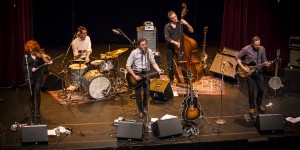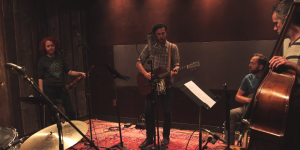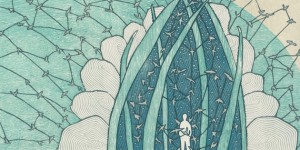Meet April's X3 Artist of the Month: Great Lake Swimmers
by Nicole Villeneuve
April 3, 2012
Tony Dekker has been operating as the chief songwriter and, for a while, only static member, of Toronto’s Great Lake Swimmers for a decade. But it took until his fifth album, New Wild Everywhere (out today), for him to settle not only into what feels like a stable roster of musicians—a real band—but also into his own skin as a musician.
We sat down with Dekker last week to talk about new old recording techniques (this is the first album he’s ever done in a proper studio), the ghosts of Toronto’s transit system, and playing for penguins.
AUX: This is your fifth album. Do you feel settled into this at this point?
Tony Dekker: With this album, I finally do. I feel like we’re in it. We’re a mainstay now. I never really knew what was going to happen with the band. I never had any goals outside of records and tours.
You’ve had success with previous releases, why do you think it took till now for it to feel like that?
I feel like, as a band, and as a songwriter too, I’ve grown into my own skin. I feel comfortable calling myself a musician after five records, and I never did before. I always took it seriously, but I never thought it was viable, early on. It was something that I did out of passion. It feels like it’s its own thing now.
Was that the way you felt going into making this album? Or was it more a product of looking back on it when you were done?
It was reflecting on it. Looking at what we made. It turned out great, I think!
I know the process making this one was different than what you’ve done before, in terms of making the album in a real studio. I thought it was funny that [producer/engineer] Andy Magoffin said it was his dream come true to have you ask to do an album in a studio.
I’ve been working with Andy now for eight years, he’s done all our records except the very first one. I wanted to give him a little bit more of a creative control. Having him be producer and call the shots a little bit more. He was so thrilled that we were even considering going into the studio that he went ahead and set everything up for us at Revolution. He was the one guiding the project, where usually, everything is definitely coming from me calling the shots. Because we know and trust Andy and have worked with him for so long, it was a really easy thing to have him step in. I was curious to see where he would take it.
What did you take from it, personally, as the principal creative force behind the band?
It was a new challenge. It’s our fifth album, but it’s our first studio album. Most bands start out that way. But we’ve been, over the past decade or so, piecing together pretty elaborate location recordings, setting up studios inside a space, building them from scratch and getting those sounds. That still really excites me, and there is some location recording on the new record, but for the most part it was really just a new challenge to see what we could do in a closed environment. I think the songwriting is still consistent to everything that we’ve done in the past. It’s on the same arc.
A couple of things you just mentioned, first the songwriting, I’d say that on this album there is some of your most straightforward, pop-structured stuff. For instance the first single (“Easy Come Easy Go”).
In a way, yeah. I should say about that song, it was just a fun one that we recorded in demo form after we got off tour for [2009’s Polaris shortlisted] Lost Channels. We just went into a studio and did it for fun, to blow off steam. We had so much fun playing it, and there was such a great chemistry in the band because we had been touring for two years at that point. I put it away for a year, and when it came time to record the new album, it was like ‘yeah, of course we gotta do that song.’ It’s a fun song to play. It’s a different song for us. It’s such a fun song to play with the band.
Was there any reluctance to include something that was initially just a no-expectations song?
That type of a song, I probably would have never considered doing in the past. But now, it just felt right.
Something else you’d mentioned was the location recording, for “The Great Exhale,” which is one of my favourite of your locations [it was recorded in a no-longer used subway station in Toronto, Lower Bay]. Why did you choose to do that in the bowels of the TTC?
I’ve always wanted to record in the TTC. You see buskers in there sometimes, and it sounds so good, the acoustics are just so nice. I really wanted to see what would happen if we got a band in there after the trains stopped running. We were there for three days, overnight, we would start at around midnight or 1am, and would go till about 6 a.m. when the trains started running again. Even still, it was difficult, because service trains still run, so we really had to pick our moments. Some of the other tracks we recorded there made it as bonus tracks on the deluxe CD and the vinyl. They’ve used that station as a set for films, so we got in touch with the TTC, and after a lot of negotiating and scheduling, which, in the end, it still wasn’t 100% certain even the week before that it was going to work out.
It’s eerie down there. I’ve only passed through when they sometimes re-route trains for other track repairs or something.
Yeah. Not to use too heavy-handed of imagery, but it’s like a ghost station. That song in particular was a nice one to record there.
I remember the City Sonic video you did about your daily TTC commute a few years ago too.
Yeah. As a matter of fact, the song that they focused on for that, “I’ll Never See The Sun,” we recorded an updated version of that song in Lower Bay Station.
Will it come out?
It’s a bonus track on the vinyl. It was ten years almost to the day that the song was written, when we re-recorded it. That was a song from the first album.
I know on the last album, “Concrete Heart” really stood out to me as another instance of that sort of city-vs.-rural divide in your music. Is that still something that influences you a lot?
I think so, for sure. Especially on a new song like “New Wild Everywhere,” with the sun sinking over the Big Smoke, shuttering light. I think it’s all still there.
Do you still have a love/hate relationship with the TTC?
(Laughs) Just love. Nothing but love. It’s an essential thing. We need to respect it.
Could you tell me a bit about your recent trip to Antarctica?
It’s called Students On Ice. Basically they take high school students on this trip, a floating classroom, a research vessel. It’s an environmental program, learning about how global warming is affecting the poles. It was really great to be included amongst different specialists, like scientists, environmentalists, emissions specialists. They had people from the arts along as well, videographers, and I made up the music aspect. It was a really well-rounded trip. That organization is really shaping our future leaders. There’s a real sense of that I got on the trip.
Did you do workshops?
I did songwriting workshops, and I also performed at the end of every day. I felt that I was really able to kind of be a sort of instrument. It was a good thing.
Did you do any location recording there?
Yeah. There’s some great video. We’re working on our new website, and we’ll probably post some there once it’s up and running. At one point, I was on one of the boats, and one of the videographers said ‘why don’t we pull up to this glacier, you have your guitar with you, why don’t you just play?’ So I played a few songs, and from the other side of the glacier, you see this penguin walk up, kind of curious. So there’s some cool video out there.
Is there anywhere you’d like to record, like a dream location?
It’s an incredible amount of time and resource, and it doesn’t always work out either. That was the nice thing about New Wild Everywhere. It was a closed environment, and there wasn’t a 50/50 chance that it wouldn’t work out. It was a proper functioning working studio. If you forgot a power cable, the entire project wasn’t sunk. I’ll probably do more location recordings in the future. I still think there’s lots of room for exploration, thematically, and logistically, and sonically. But I’m always on the lookout. Always testing out acoustics.
There sounds like a cohesion on the record too, do you think that’s a result of the closed environment?
I think it’s the band, too. It’s been the same line-up now for two and a half years or so. There wasn’t any hour-long sessions. We were all there the whole time. Great Lake Swimmers has always been a vehicle for my songs, to an extent. That’s how it started. But now I feel like we’ve locked into something.
Tags: Music, Featured, Interviews, News, Great Lake Swimmers, Tony Dekker





